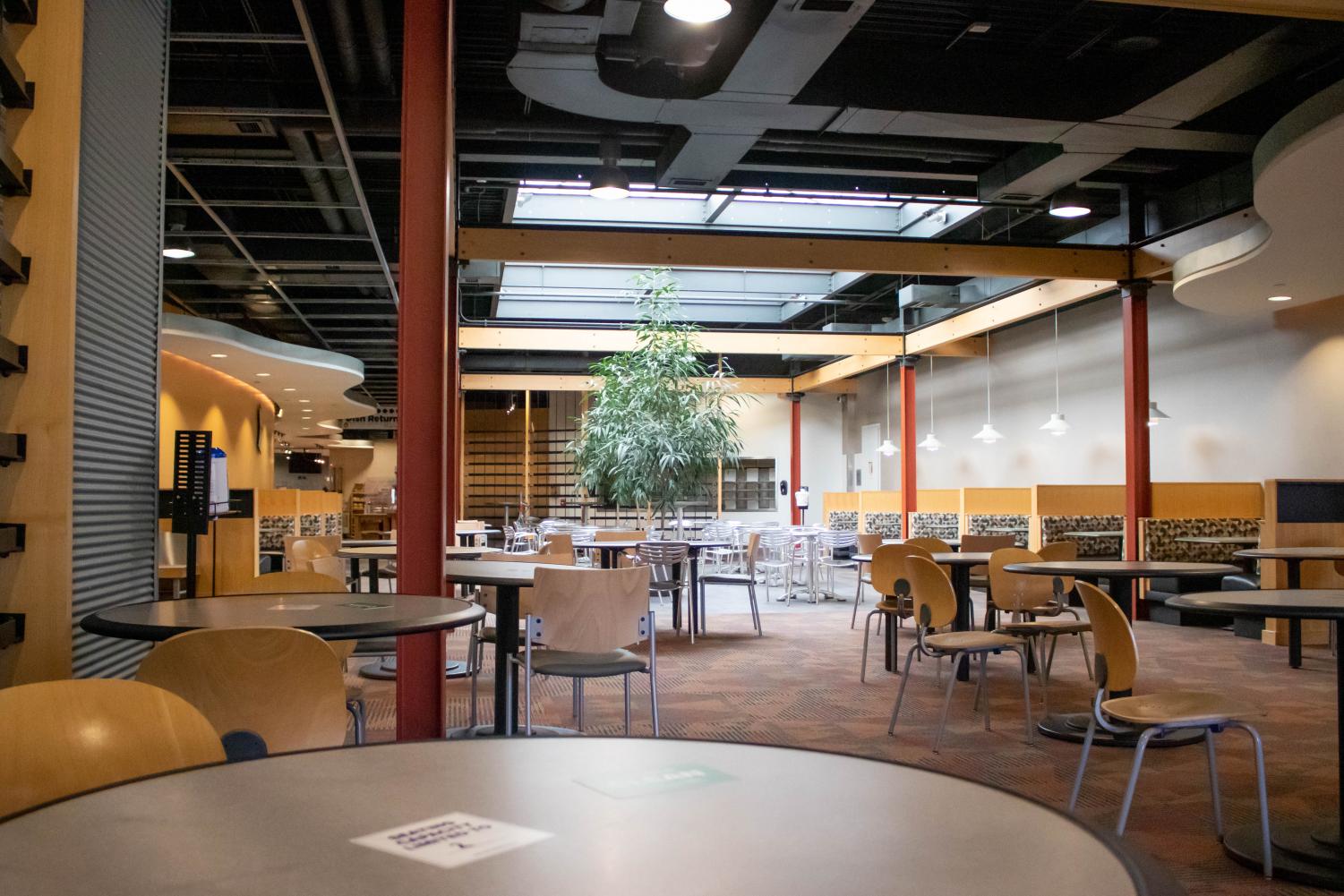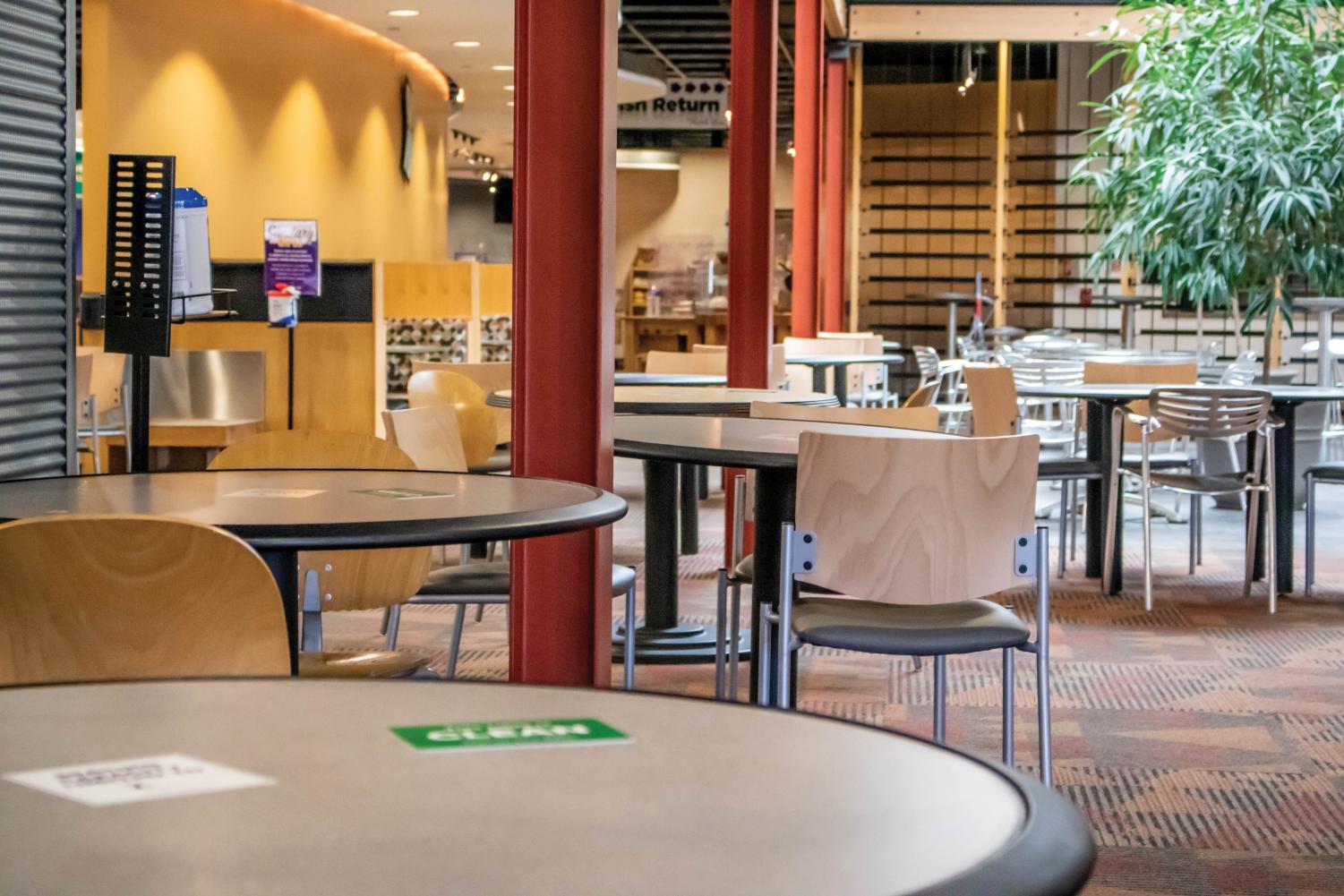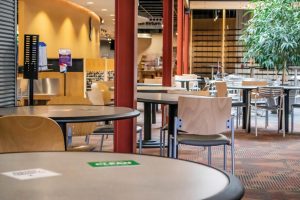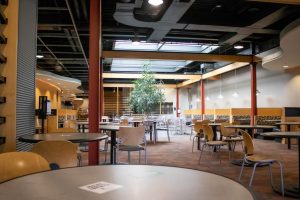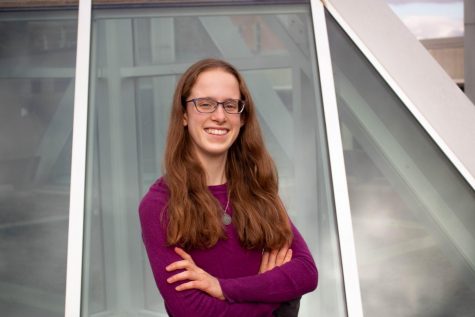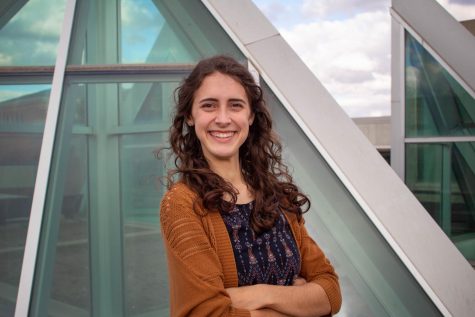Dining Centers continue to adapt
Oct 19, 2020
With COVID-19, social distancing and capacity limits, meeting the needs of students while keeping everyone safe was always going to be challenging for the UNI dining centers.
But over halfway into this unusual fall semester, UNI Dining Services Director Janet Despard is pleased with how dining center staff have handled the many changes that have come their way.
“They’ve been absolute troopers, being flexible and understanding and supportive, and they know that we’re here to serve students, and they’re on the front lines every day,” she said. “Our staff have been nothing short of amazing.”
Adjustments at Rialto and Piazza have continued throughout the semester as UNI Dining constantly re-evaluates safety procedures while striving to offer high-quality dining.
“Every student and employee at the Rialto is really trying to keep things going smoothly as possible in the most clean and effective way,” said Garrett Pospisil, a junior communication sciences and disorders major who works as a student supervisor in Rialto. “Sometimes it is hard with COVID, and it does limit things, (but) we are still trying to make sure that everyone is getting their money’s worth and getting the most out of their experience here while protecting themselves.”
Despard said that as the semester has progressed, UNI Dining has shifted to gradually offer more self-service options while still maintaining safety.
“When we were first starting off the year, we were moving forward with the idea that we would need to serve everything. We were prepared to be literally putting ketchup into little cups for people to pick up and go,” Despard said. “(Now), technically, the guidance says we can offer self-service, but I think we’re being abundantly cautious by limiting how much of it is self-service. There’s still a lot of perceptions and concerns about ‘how many people have touched this utensil,’ and we don’t want people to feel uncomfortable.”
The limited self-service options in the dining centers now include certain condiments and, in a mid-semester change, pizza.
Despard explained that when workers served pizza directly to students, the line inevitably moved more slowly, causing a backlog and increasing the number of students standing in close proximity. Recognizing this inability to socially distance as the greater of two evils, they shifted to self-service, with staff changing the pizza spatula with every new pie.
“We know now that being near people is a more dangerous proposition perhaps than a common contact point,” Despard said.
However, many offerings which were traditionally self-serve, such as the salad bar, are still being handled by student workers. The necessity for extra hands to man these stations has meant a slight reduction in dining center offerings, according to Despard.
“We don’t have Wok made-to-order at Piazza (except) in the middle of the afternoon when it’s quieter and the staff can manage it,” she said. “For a while, we were serving on disposable paper products to have fewer staff in the dishroom. We’ve gradually re-introduced those things.”
Pospisil said that although options are limited, he feels students are still getting their money’s worth out of their meal plans.
“Now that we’ve gotten used to the flow of things and we’ve gotten more employees, I would feel like now they are paying for what they would have originally paid for,” he said. “At the beginning, things were reduced more, (and) the amount of options wasn’t there, but we’ve gotten to a point where we’re trying to make every option available.”
Many of these adjustments have been motivated by student input, said Annie Karr, Assistant Director of Marketing and Conference Services.
For example, after hearing concerns about students pulling tables together and eating in large groups, UNI Dining put capacity limits on the tables. Social distancing reminder decals were also installed at dining center entrances after Karr received a private message from a concerned student.
“We take it all in stride, and the complaints that we do get, we really try to listen to those, and if they’re something we’re able to work with, then we will,” Karr said.
In the next few weeks, UNI Dining staff will begin planning for the spring semester, but Despard said that plan will remain flexible based on the changing public health situation.
“If the pandemic has taught us anything, it’s taught us to be a lot more nimble and responsive,” Despard said. “It’s the middle of October and spring semester doesn’t start until January 25…. we have all winter to go here.”
The new winter term will serve as a trial run for several options UNI Dining is hoping to introduce to welcome back more self-service. One option is a test model of a touch-free cereal dispenser created by General Mills, which Despard is excited to put into action.
“Winter break… will be a good time to assess and try some things and (see) if we can find safer ways of doing things that provide more self-service options,” she said.
A winter break meal plan, with dine-in and to-go options, will be available for faculty, students and staff, offering 10 meals for $64. Piazza will be open during the first half of the winter term, from Nov. 28-Dec. 23, with Rialto open during the second half-term, from Jan. 2-21. Both dining centers will be closed Dec. 24–Jan. 1. More information is available at https://dor.uni.edu/dining/winter-break.

